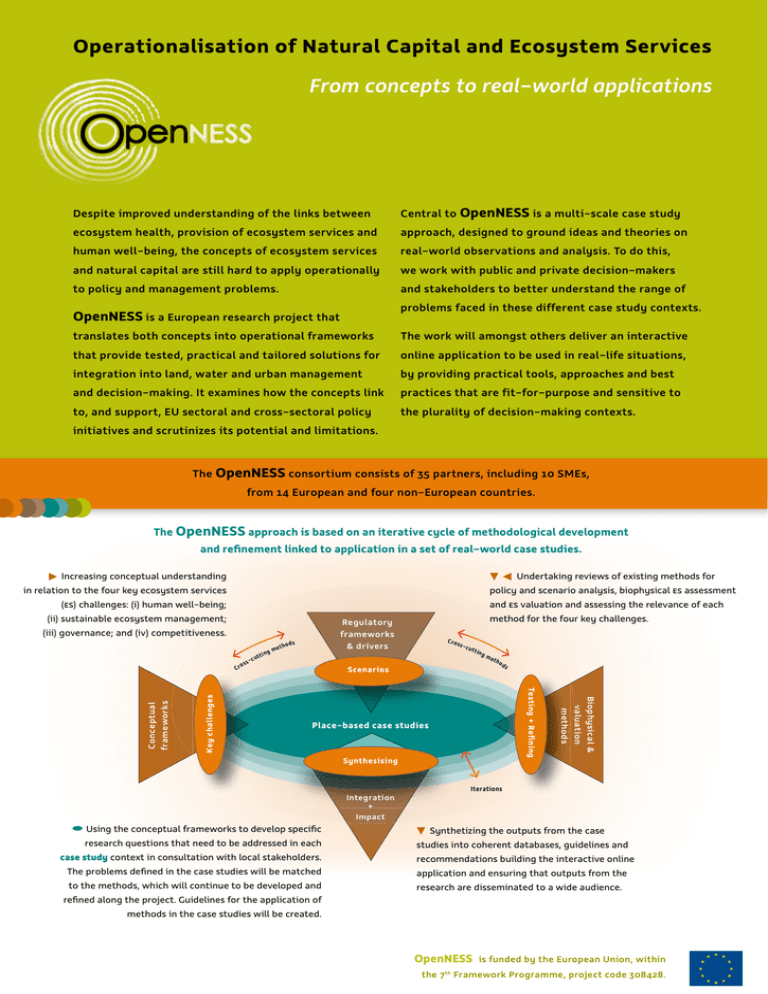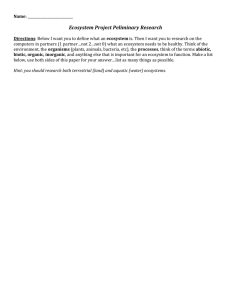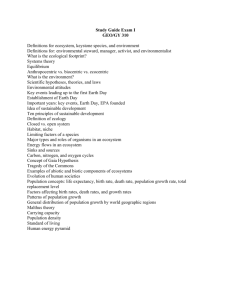From concepts to real-world applications
advertisement

Operationalisation of Natural Capital and Ecosystem Services From concepts to real-world applications Despite improved understanding of the links between Central to OpenNESS is a multi-scale case study ecosystem health, provision of ecosystem services and approach, designed to ground ideas and theories on human well-being, the concepts of ecosystem services real-world observations and analysis. To do this, and natural capital are still hard to apply operationally we work with public and private decision-makers to policy and management problems. and stakeholders to better understand the range of problems faced in these different case study contexts. OpenNESS is a European research project that translates both concepts into operational frameworks The work will amongst others deliver an interactive that provide tested, practical and tailored solutions for online application to be used in real-life situations, integration into land, water and urban management by providing practical tools, approaches and best and decision-making. It examines how the concepts link practices that are fit-for-purpose and sensitive to to, and support, EU sectoral and cross-sectoral policy the plurality of decision-making contexts. initiatives and scrutinizes its potential and limitations. The OpenNESS consortium consists of 35 partners, including 10 SMEs, from 14 European and four non-European countries. The OpenNESS approach is based on an iterative cycle of methodological development and refinement linked to application in a set of real-world case studies. a Increasing conceptual understanding in relation to the four key ecosystem services (es) challenges: (i) human well-being; (ii) sustainable ecosystem management; (iii) governance; and (iv) competitiveness. met hod s C ro s s-c utt Scenarios ing me tho ds Place-based case studies Synthesising Iterations Integration + Impact H Using the conceptual frameworks to develop specific research questions that need to be addressed in each case study context in consultation with local stakeholders. The problems defined in the case studies will be matched to the methods, which will continue to be developed and refined along the project. Guidelines for the application of methods in the case studies will be created. Biophysical & valuation methods Key challenges ing Regulatory frameworks & drivers Testing + Refining Conceptual frameworks C s ro s tt -cu d g Undertaking reviews of existing methods for policy and scenario analysis, biophysical es assessment and es valuation and assessing the relevance of each method for the four key challenges. d Synthetizing the outputs from the case studies into coherent databases, guidelines and recommendations building the interactive online application and ensuring that outputs from the research are disseminated to a wide audience. OpenNESS is funded by the European Union, within the 7 Framework Programme, project code 308428. th Case studies The OpenNESS case studies cover a range of socioecological systems and are clustered according to the policy and management focus for ecosystem service operationalisation. Sustainable urban management Management of forests/ woodlands Management of mixed rural landscapes Integrated river basin management Coastal area management Commodity export dominated areas in developing countries www.openness-project.eu info@openness-project.eu OpenNESS_eu Operationalisation of Natural Capital and Ecosystem Services Partners a Finnish Environment Institute (SYKE) • Finland (coordination) a Helmholtz-Centre for Environmental Research (UFZ) • Germany a Wageningen University and Research Centre (Alterra) • Netherlands a Netherlands Environmental Assessment Agency (PBL) • Netherlands a Centre for Ecology and Hydrology (CEH-NERC) • United Kingdom a University of Oxford (UOXF-ECI) • United Kingdom a University of Nottingham (UNOTT-CEM) • United Kingdom a Norwegian Institute for Nature Research (NINA) • Norway a Research Institute for Nature and Forest (INBO) • Belgium a Joint Research Centre (JRC-IES) • Italy a University of Helsinki (UH) • Finland a European Centre for Nature Conservation (ECNC) • Netherlands a National Research Institute of Science and Technology for Environment and Agriculture (IRSTEA) • France a Centre for Ecological Research of the Hungarian Academy of Sciences (MTA ÖK) • Hungary a University of Bucharest (UB-DSES) • Romania a Forest Research and Management Institute (ICAS) • Romania a Institute of Landscape Ecology of the Slovak Academy of Sciences (ILE SAS) • Slovakia a Centre for Environmental and Sustainability Research, University of Lisbon (CENSE FFCT-UNL) • Portugal a Fundación Tecnalia Research & Innovation • Spain a Autonomous University of Madrid (UAM) • Spain a Autonomous University of Barcelona (UAB) • Spain a Danish Centre for Environment and Energy, Aarhus University (AU) • Denmark a Environmental Social Science Research Group Ltd (ESSRG) • Hungary a Environment Bank Ltd (EBL) • United Kingdom a HUGIN Expert AS • Denmark a Vista Analysis AS • Norway a REGIOPLÁN Nitra • Slovakia a IRIDRA Srl • Italy a Geoflux GbR • Germany a Indian Institute of Bio-Social Research and Development Society (IBRAD) • India a Wing Process Consultancy • Netherlands a Kinross Estate Company • United Kingdom a São Paulo State University (UNESP) • Brazil a Austral Scientific Research Centre (CADIC CONICET) • Argentina a Kenya Forestry Research Institute (KEFRI) • Kenya Designed by x-hoogte • Printed on recycled paper • Tilburg December 2013

